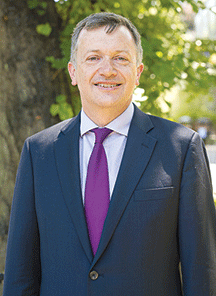Dilip Thakore interviewed Michael O’Sullivan, CEO of Cambridge International Examinations, in Cambridge, UK. Excerpts:
 Although CIE is the largest provider of international education worldwide, it isn’t Britain’s largest provider of primary and secondary education in terms of the number of affiliated schools and students. How do you explain this seeming paradox?
Although CIE is the largest provider of international education worldwide, it isn’t Britain’s largest provider of primary and secondary education in terms of the number of affiliated schools and students. How do you explain this seeming paradox?
There are five major school examination and certification boards in the UK — OCR, Edexcel, AQA and WJEC as well as Cambridge International Examinations. It’s quite normal for a school to be affiliated with one or more of them for different subjects.
For example, a school may choose to affiliate with OCR — itself also a part of Cambridge Assessment — for science subjects and Cambridge International Examinations for the social sciences and humanities, or vice versa, with the choice often left to departmental heads of schools. However, students of several top-ranked UK schools, including Eton, Winchester and Westminster, take our exams.
The International Baccalaureate Organisation, which also offers K-12 international education and qualifications, is reportedly closing the gap in terms of number of affiliated schools. What are the differentiating features of CIE syllabuses and administration?
We have a rule in Cambridge of not commenting upon the characteristics or performance of other examination boards. Therefore all I can say is that they have a big gap to close. The differentiating features of Cambridge syllabuses, curriculums and supplementary services provided to affiliated schools are that we offer students a wide choice of subjects, especially at the higher secondary A level, leaving it to schools and students to make their own blends. We don’t enforce a blend. Secondly we provide very clear syllabuses. This is important for teachers because it enables them to master teaching and the curriculum development process. And thirdly, we are committed to continuous revision of our syllabuses and assessment processes. Our objective is to prepare children for the future, and we enjoy the work.
A rising complaint of parents and students is that school syllabuses tend to be out of sync with the requirements and needs of academia and industry. To what extent is this criticism applicable to CIE?
At Cambridge, we are aware of this criticism of exams in general. That’s why we revise our syllabuses every six years through a painstaking revision process with the involvement of universities, industry and business to ensure that students of affiliated schools are thoroughly prepared for university, and are equipped with strong foundational education for industry, business and the professions. The revision process has multiple strands and engages more than 100 of our employees. As part of this process, we work with a range of publishers to provide high-quality resources such as books, CD/DVDs and websites to help teachers plan and deliver Cambridge programmes.
One of CIE’s objectives is to work with governments abroad to customise their syllabuses. Is the board engaged with any government (Central or state) in India towards this end? To what extent are CIE syllabuses customised for Indian conditions?
Cambridge personnel are currently working with governments in some 30 countries, including, among others, Singapore, Egypt, Kazakhstan, Malaysia and Mongolia, helping them refresh their syllabuses and exam assessment systems. Although a majority of our affiliated schools overseas are privately-promoted institutions, we have no hesitation about working with government and/or government schools.
What are the teacher education and development services that the board provides to affiliated schools around the world?
We offer three types of support. Firstly, face-to-face, syllabus-specific training, for which we send out experts from the UK to affiliated schools. Currently, we have 200 expert trainers, and the number will rise next year. Secondly, we provide in-service professional development programmes and certification to teachers through our Professional Development Qualification centres worldwide. The programme is accredited by the UCL Institute of Education. Thirdly, we offer online teacher training and exchange programmes as also resources such as workshops, events, global conferences and so on.
What are your growth plans for CIE in India and beyond?
Currently, 389 schools in India are affiliated with Cambridge International Examinations. Over the next five years, the number will rise to 500, as we expect 25 schools to sign up with us every year. Affiliating with Cambridge is not difficult, as we are flexible about helping and preparing schools for affiliation and our fee and levies are affordable. Nor do we expect schools to develop dazzling infrastructure. Except for requirements about the security of exams and the safety of labs, we are flexible about infrastructure norms. It’s a school’s capacity to offer quality education and desire to do better which matters most to us.